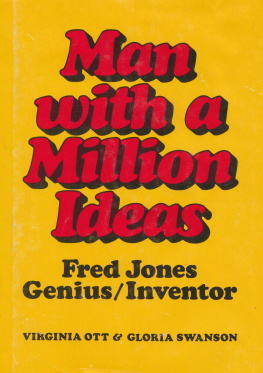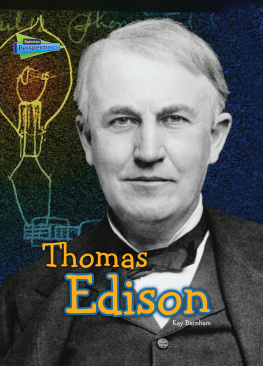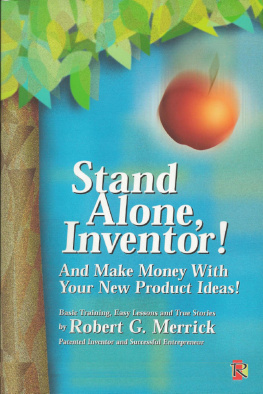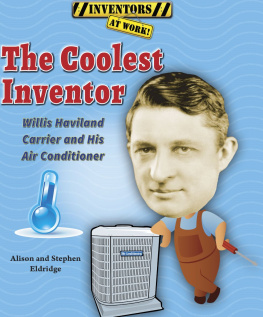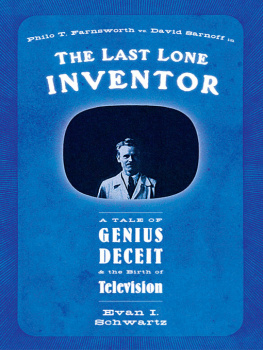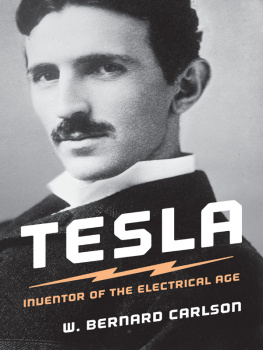Man
with a
Million
Ideas
Fred Jones
Genius/Inventor
Virginia Ott & Gloria Swanson
Copyright 1977 by Lerner Publications Company
All right reserved. International copyright secured.
Acknowledgements
Because we never met Frederick McKinley Jones, the story of this remarkable man came to us through the memories of those who worked and lived with him. Time may have mixed fact and fiction, humor and sadness, misunderstanding and acceptance, where stories of Fred Jones are told today. But one idea came through in every interview: That Fred, he could do anythinga regular genius!
For their aid in the preparation of this book, we would like to express our appreciation to the following people:
We thank those citizens of Hallock who helped acquaint us with Casey Jones and the 18 years that he spent among them.
We thank Frances I. Brewer, Stanley Grunewald, Norval L. Youngstrom, and others who told us about the Thermo King years.
And, above all, we thank Joseph A. Numero for sharing with us his many memories of the man he cared for and worked with for 30 years.
This book is not only the Fred Jones story. It is also the story of Joseph Numero and the Thermo King Company.
Prologue
In February 1961, Fred Jones, black engineer and inventor, died at the age of 68. The death of this remarkable man was in many ways the end of an era. It is doubtful if ever again a self-taught professional with only four years of formal schooling will rise to head the experimental division of a multi-million-dollar concern and live to see his inventions bring convenience to people all over the world.
Fred Jones died a satisfied man. He had achieved goals in his lifetime. He had loved and been loved. He had realized joy in his work. Ive been a lucky man, he said shortly before his death. Ive done all the things I wanted to do.
Of his beginnings, Fred Jones knew very little. He did remember his father, a red-haired, affectionate Irishman. He had been told that his mother, a black woman, had abandoned the two of them soon after Freds birth. He remembered only a few happy incidents from his brief childhood. Of these, one was the day that he fixed his fathers pocket watch.
1
Childhood
A skinny little black boy sat in a cluttered back yard in Cincinnati, Ohio, absorbed in concentration. His long, sensitive fingers carefully finished putting something together. A smile spread over his eager face as he sat back to look at what he had done. The evening sun glinted from the round object that he held in his small hands.
Down the alley trudged a tall, red-haired man carrying a lunch pail. He wore the bib overalls and the striped cap of a railroad worker. His eyes were sad, but he forced a smile as he pushed open the squeaky gate, walked over to the boy, and rumpled his brown, wavy hair.
And what has my son been doin all day, now?
The boy jumped up and held out his hand.
Heres your old watch, Daddy! I found out how it makes that ticking noise. I took it apart and I found out!
Sure, and did I hear you right, Freddie? You did what?
I took it apart cause the ticking had stopped. Then I put it together again and the ticking came back. Listen!
John Jones listened and looked in astonishment. Fred was only five years old. What did the Lord mean, giving a poor Irish worker a child like this? Time and again, John Jones came from work to find Freddie tinkering with odd tools and abandoned gadgets, utensils, and machinery, taking them apart and putting them together again, trying to see how they worked.
One of the mechanical devices that fascinated Fred was the small wagon that his father had made for him, using four discarded wheels. The boy played with the wagon until the rubber was gone from the wheel rims. By his sixth birthday his father had saved enough money to buy a small coaster wagon. Now Fred ran up and down the street pulling his new toy behind him. All at once he stopped beside the old wagon, looking from it to the new one.
Daddy, my new wagon is easier to pull. Why?
But he did not wait for an answer. Grabbing some tools, he began taking both wagons apart.
Daddy, look what this ones got! He opened a small greasy fist filled with the ball bearings from the new wagon. Are these what makes it go better, Daddy? If we could put them on the old wagon, would it go better too? Fred gazed at the discovery he held in his hand.
Mr. Jones looked wearily at the two wagons strewn in parts all over the yard. What kind of a son did he have anyway, always taking things apart? Always asking questions? Always that look of wonder in his brown eyes.
This inquisitive boy, Frederick McKinley Jones, was born on May 17, 1893, in Covington, Kentucky, across the river from Cincinnati, Ohio. The black woman who was his mother disappeared shortly after his birth. Fred lived with his father, a red-haired, blue-eyed Irishman, in a series of rooming houses in Cincinnati. Wherever they happened to be, John Jones would pay the landlady to take care of Fred during the daytime.
Most of these landladies, however, were usually too busy to pay much attention, and Fred did just about as he pleased. He played wherever he wanted toin streets, in alleys, and in mud puddles. The younger boys on the block did not play with Freddie Jones, the older boys teased him.
Hey, little Jones! How come you got a white Pa? And how come your hair aint curly? And when you going to school? they taunted.
Fred didnt know the answers. Once he asked his father these questions.
Freddie, your Ma was a pretty black girl. When you was born I decided wed make a real home. An Irishman is proud of his own flesh and blood. Then, your Ma just up and left. I never saw her again. Now you just tell those kids to shut their mouths or your Daddy will take a shillelagh to them and make grease spots of their folks!
When Fred got into a fight, or was bumped or scratched, he had no one to run to. He just wiped away his own tears. Then in the evening he would tell his father what had happened. John Jones would listen, then give his son the same advice, over and over again.
Freddie, dont pay a mind to what others say or the way they look at ya. You go ahead and do what seems right for you !
By the time Fred was seven, he was strong, independent, and big for his age. Landladies no longer wanted to be responsible for watching him.
That boy of yours belongs in school, not running after cars, fighting in the streets, and tearing everything apart, they told Freds father.
Sure, and I know youre right, Mr. Jones agreed. Freddie needs more than I can give him. Hes a smart lad. Hes got to go to school. We cant go on living like this! Its goin to be tough enough for Freddie to amount to something. Him staying with me, a white man always driftin around, isnt goin to help him make his way. For Freddies own good Im goin to have to give him to somebody else to look after. Now who would want a little black boy?
One Saturday morning John Jones put Freds few belongings in a box and walked with him across the big bridge into West Covington, Kentucky. There they went to the rectory of a Catholic priest, Father Ryan. Fred sat on the back step a long time while his father and the priest talked together inside.
Wish I could hear what theyre talkin about in there, Fred thought. Finally, his father came out the door.
Freddie, Im leaving you here with Father Ryan. Hell give you a home and hell get you to school so you can learn to read. Now be a good boy and help Father in all the ways you can.
Next page
